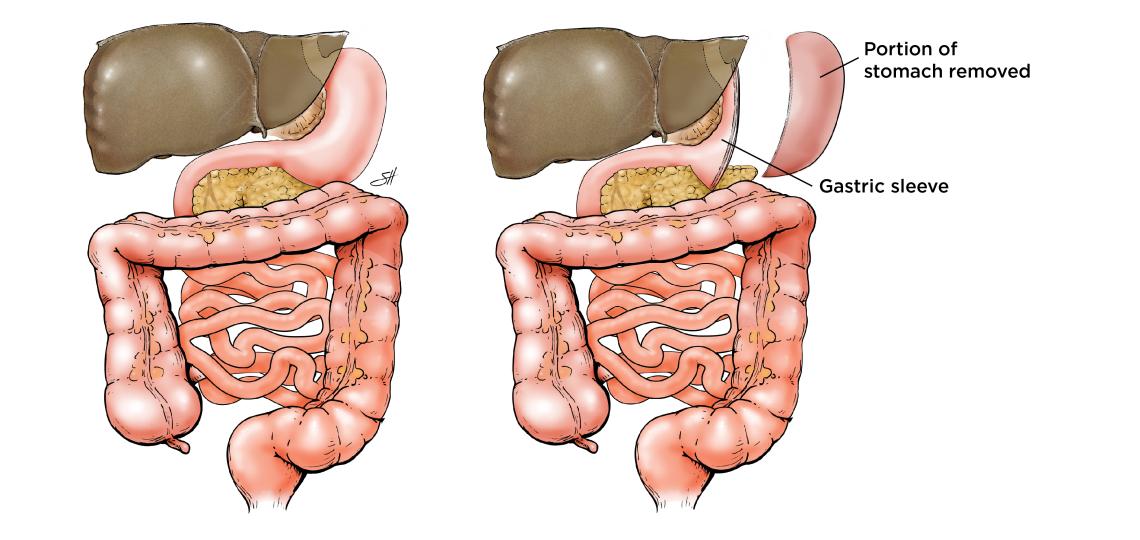Sleeve Gastrectomy (also known as gastric sleeve)
This surgery is done by making several small incisions and using small instruments and a camera to guide the surgery (laparoscopic approach). More than half of your stomach is removed, leaving a thin vertical sleeve that is about the size and shape of a banana. Surgical staples keep your new stomach closed. Because part of your stomach has been removed, this is not reversible.
Why is gastric sleeve surgery done?
"Everyone deserves to be happy and healthy. This surgery can change your whole life, and for many people will save their lives. Your life will improve in ways you cannot imagine."
-Lindsay M.
The sleeve gastrectomy involves removing a large part of the stomach. This is the part that stretches during meals, and also the part that produces a chemical messenger (hormone) that stimulates appetite. Patients who have this operation report much less hunger after surgery.
This operation takes about an hour to complete and patients stay in the hospital for usually 1 night.
Weight-loss surgery is suitable for people who are overweight and who have not been able to lose weight with diet, exercise, or medicine.
Surgery is generally considered when your body mass index (BMI) is 40 or higher. Surgery may also be an option when your BMI is 35 or higher and you have a life-threatening or disabling problem that is related to your weight.
It is important to think of this surgery as a tool to help you lose weight. It is not an instant fix. You will still need to eat a healthy diet and get regular exercise. This will help you reach your weight goal and avoid regaining the weight you lose.
The surgery will take about 1 to 3 hours.
What can you expect after gastric sleeve surgery?
You will have some belly pain and may need pain medicine for the first few days or so after surgery.
Because the surgery makes your stomach smaller, you will get full more quickly when you eat. Food also may empty into the small intestine too quickly. This is called dumping syndrome. It can cause diarrhea and make you feel faint, shaky, and nauseated. It also can make it hard for your body to get enough nutrition.
Eating after surgery
Your doctor will give you specific instructions about what to drink and eat after the surgery. For about the first month after surgery, your stomach can only handle small amounts of soft foods and liquids while you are healing. It is important to try to sip water throughout the day to avoid becoming dehydrated. You may notice that your bowel movements are not regular right after your surgery. This is common.
Bit by bit, you will be able to add solid foods back into your diet. You must be careful to chew food well and to stop eating when you feel full. This can take some getting used to because you will feel full after eating much less food than you are used to eating. If you do not chew your food well or do not stop eating soon enough, you may feel discomfort or nausea and may sometimes vomit. If you drink a lot of high-calorie liquids such as soda or fruit juice, you may not lose weight.
Your doctor will probably recommend that you work with a dietitian to plan healthy meals that give you enough protein, vitamins, and minerals while you are losing weight. Even with a healthy diet, you probably will need to take vitamin and mineral supplements for the rest of your life.
© 2016-2021 Healthwise, Incorporated.








 Credit
Credit
